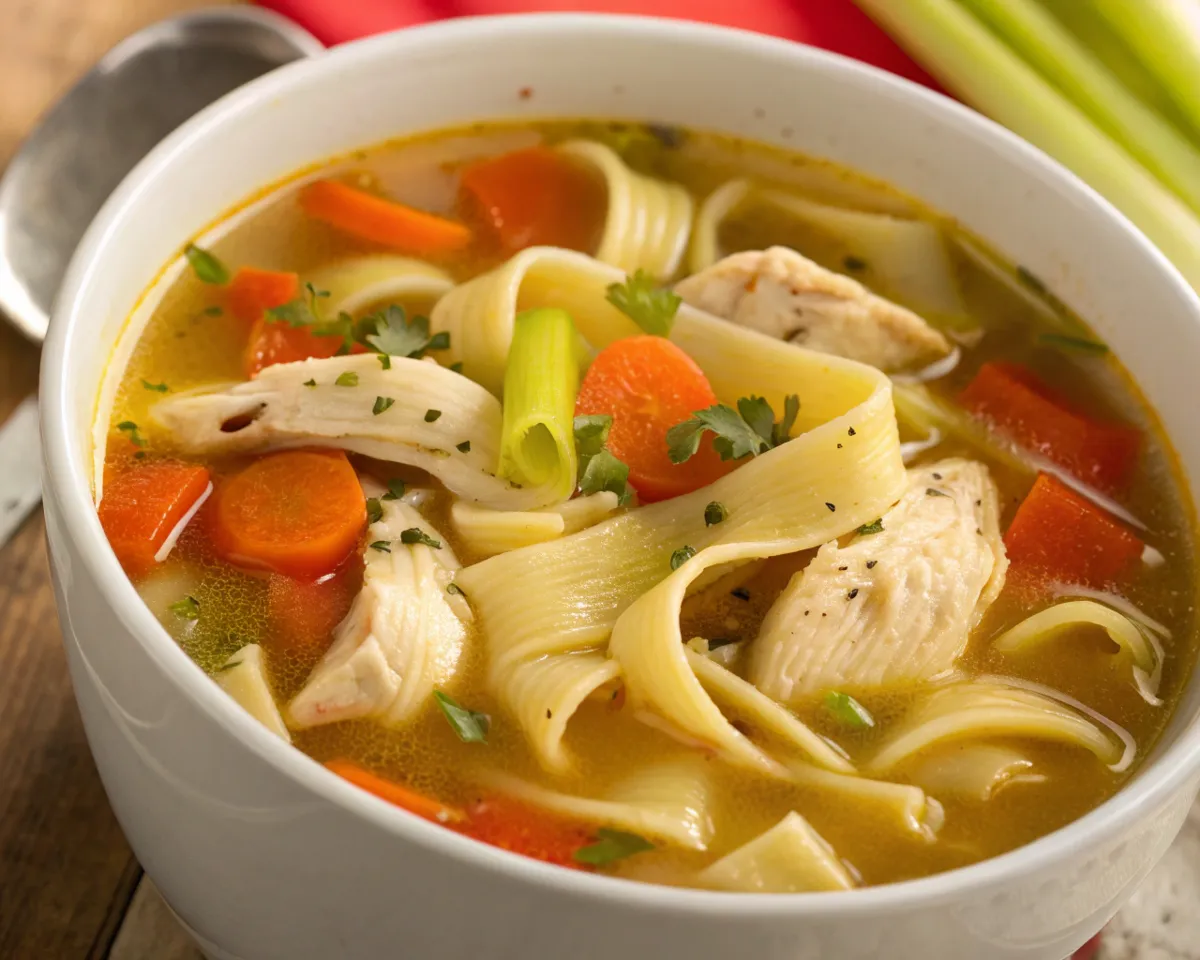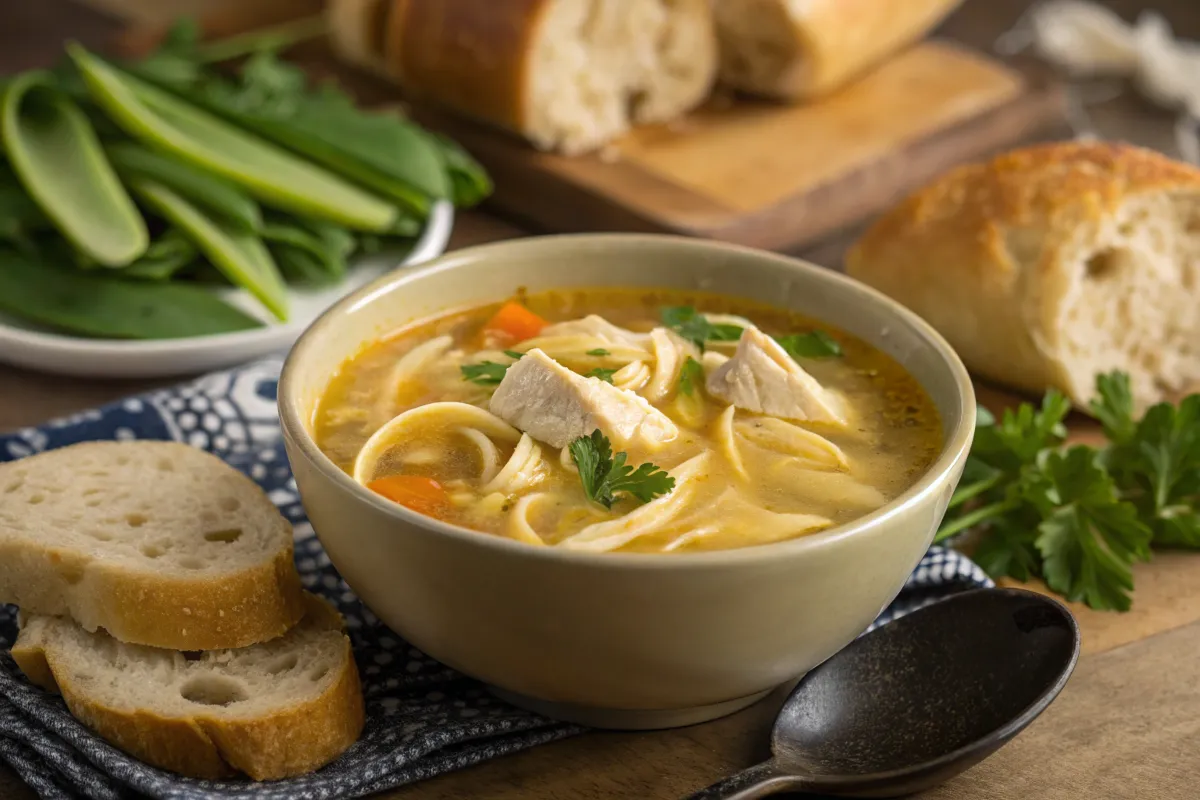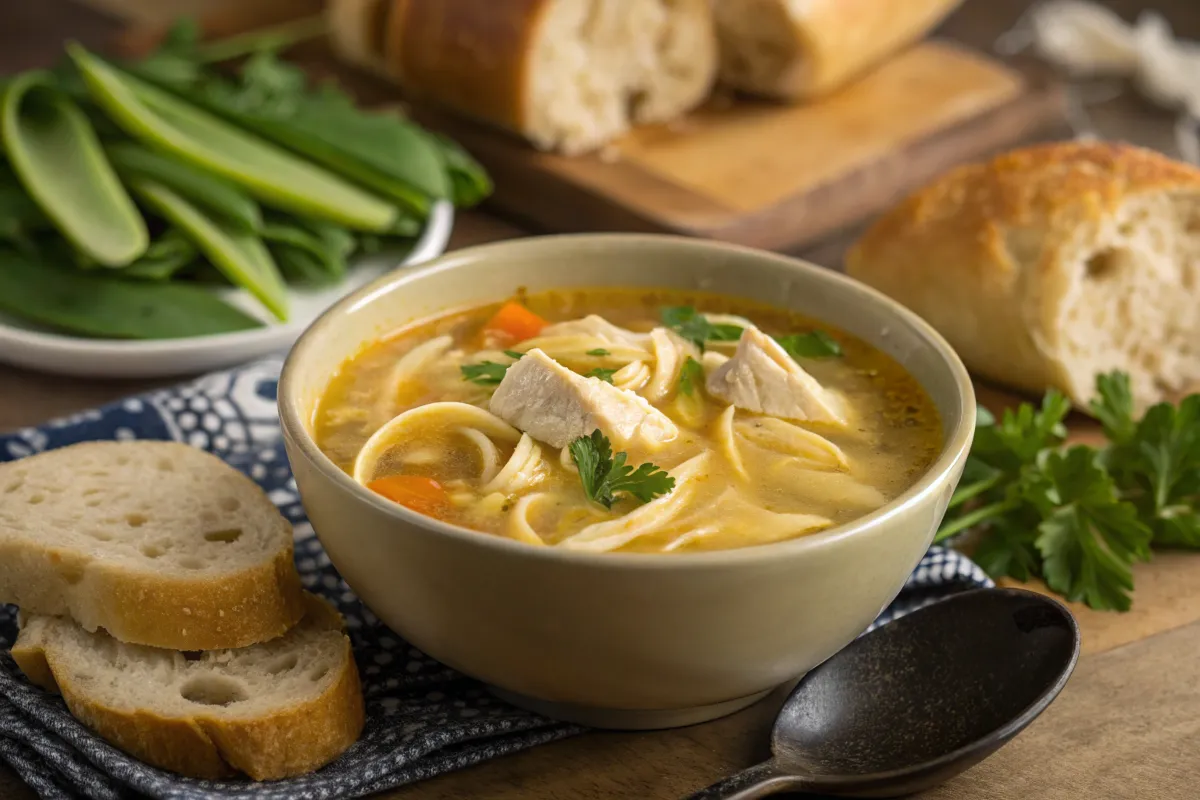Chicken noodle soup is a comforting classic. It’s more than just a tasty meal. This ultimate guide unveils 7 amazing secrets behind its potential health benefits.
Understanding Chicken Noodle Soup
Chicken noodle soup is a broth-based soup. It contains chicken, noodles, and vegetables. Common vegetables include carrots, celery, and onions. It’s often enjoyed during cold and flu season. Many believe it helps alleviate symptoms.
The 7 Incredible Health Benefits of Chicken Noodle Soup
Chicken noodle soup offers a range of potential benefits. These stem from its ingredients and preparation.
Hydration Powerhouse
Soup, in general, is highly hydrating. The broth provides fluids essential for bodily functions. Staying hydrated is especially important when you’re sick. It helps with decongestion and overall well-being.
Nutrient-Rich Ingredients
Chicken is a good source of protein. This aids in tissue repair and immune function. Vegetables contribute vitamins and minerals. Carrots offer vitamin A, essential for vision and immunity. Celery and onions provide vitamin K and vitamin C, respectively. These are all important for the immune system.
Natural Decongestant
The warm broth can help loosen nasal congestion. Steam from the soup can also open up airways. This makes breathing easier when you’re stuffed up. The heat helps clear the sinuses.
Anti-Inflammatory Properties
Some studies suggest that chicken noodle soup has anti-inflammatory effects. Ingredients like chicken and vegetables contain compounds that may reduce inflammation. Reducing inflammation is key to recovery.
Soothing Sore Throat Relief
The warm broth can soothe a sore throat. Its gentle nature reduces irritation. It helps make swallowing more comfortable.
Boosts Immune System
The combination of vitamins, minerals, and protein strengthens the immune system. Chicken noodle soup gives the body the resources it needs to fight off infections. This makes recovery faster.
Emotional Comfort
Beyond physical benefits, chicken noodle soup provides emotional comfort. It’s often associated with warmth, care, and nostalgia. These feelings contribute to a sense of well-being.
Image Placeholder: A steaming bowl of chicken noodle soup with visible chicken, noodles, and vegetables. Alt text: Chicken Noodle Soup for Comfort
The Science Behind the Soup
Researchers have explored the potential benefits of chicken noodle soup. Studies suggest it may have anti-inflammatory effects. One study from the University of Nebraska Medical Center found that chicken soup inhibited neutrophil migration. Neutrophils are white blood cells involved in inflammation. This suggests a potential mechanism for its symptom-relieving effects. The specific combination of ingredients matters.
Making the Perfect Chicken Noodle Soup
Creating a truly beneficial chicken noodle soup involves careful selection of ingredients. Using high-quality chicken and fresh vegetables is crucial. Homemade broth is often more nutritious than store-bought versions. Simmering the ingredients slowly allows the flavors to meld. This also maximizes the extraction of nutrients.
Choosing the Right Ingredients
Opt for organic chicken if possible. Select a variety of colorful vegetables. Consider adding herbs like thyme or rosemary. These add flavor and have antioxidant properties. Fresh ingredients ensure a healthier and more flavorful soup.
Broth is Key
Making your own broth is a rewarding process. Simmer chicken bones with vegetables and herbs for several hours. This extracts collagen and minerals. Homemade broth is richer in nutrients and flavor. It lacks the additives found in many store-bought broths.
Slow Simmering
Slow simmering allows the flavors to meld and deepen. It also helps extract nutrients from the ingredients. Simmer the soup for at least an hour. Longer simmering times can enhance the flavor.
Image Placeholder: Ingredients for chicken noodle soup laid out, including chicken, carrots, celery, onions, and broth. Alt text: Ingredients for Amazing Chicken Noodle Soup
Variations and Adaptations
Chicken noodle soup is a versatile dish. It can be adapted to suit different dietary needs and preferences.
Vegetarian Options
Vegetarian versions can be made with vegetable broth and plant-based protein sources. Tofu or lentils can replace the chicken. Add extra vegetables to compensate for the lack of meat.
Gluten-Free Adaptations
Use gluten-free noodles for a gluten-free version. Rice noodles, quinoa noodles, or zucchini noodles are good alternatives. Be sure to check the ingredients of any store-bought broth to ensure it is gluten-free.
Spicing it Up
Add spices like ginger, garlic, or turmeric for extra flavor and potential health benefits. Ginger has anti-inflammatory properties. Garlic is known for its immune-boosting effects. Turmeric contains curcumin, a powerful antioxidant.
Addressing Common Concerns
While generally healthy, there are a few things to consider when consuming chicken noodle soup.
Sodium Content
Some store-bought soups can be high in sodium. Too much sodium can lead to high blood pressure. Opt for low-sodium versions or make your own soup to control the sodium content.
Allergies
Be mindful of potential allergies. Chicken, wheat (in noodles), or specific vegetables can trigger allergic reactions in some individuals. Always check the ingredients list carefully.
Sugar Content
Some canned soups contain added sugar. This is often used to enhance the flavor. Excess sugar consumption is detrimental to health. Read the nutrition label and choose soups with minimal added sugar.
Image Placeholder: Comparing a homemade bowl of chicken noodle soup vs. a canned soup. Alt text: Chicken Noodle Soup comparison
Chicken Noodle Soup in Different Cultures
Chicken soup is a staple in many cultures around the world. Each culture has its own unique variations and traditions.
Jewish Penicillin
In Jewish culture, chicken soup is often referred to as “Jewish penicillin.” It’s a traditional remedy for colds and flu. The soup is typically made with matzo balls or noodles. It is believed to have healing properties.
Asian Variations
Asian cultures often include ginger, garlic, and other spices in their chicken soup. Some variations use rice noodles instead of wheat noodles. These soups are often served with toppings like cilantro and scallions.
Latin American Adaptations
In Latin America, chicken soup is often called “sopa de pollo.” It may include ingredients like rice, potatoes, and plantains. It’s a common comfort food during illness.
Chicken Noodle Soup for Long-Term Health
Incorporating chicken noodle soup into your diet can contribute to long-term health and well-being.
Regular Consumption
Enjoying chicken noodle soup regularly can help maintain hydration. It also provides essential nutrients. Making it a part of your weekly menu is a good habit.
Preventative Measures
Consuming chicken noodle soup during cold and flu season can help boost the immune system. This may reduce the severity and duration of illnesses.
Overall Wellness
Chicken noodle soup contributes to overall wellness. It’s a nourishing and comforting food. It supports both physical and emotional health.
Image Placeholder: A person enjoying a bowl of chicken noodle soup with a happy and relaxed expression. Alt text: Chicken Noodle Soup for Well-being
Chicken Noodle Soup: A Timeless Remedy
Chicken noodle soup is a timeless remedy with numerous potential health benefits. From hydration to immune support, it’s a valuable addition to any diet. Understanding its properties and variations can enhance its effectiveness. Make it a go-to meal for comfort and well-being.
Chicken Noodle Soup: The Essential Comfort Food
Chicken noodle soup remains a favorite. Its simplicity and comforting nature are unparalleled. It offers real potential health advantages. Its place in our culinary traditions is secure.
FAQ
Is chicken noodle soup actually good for you?
Yes, chicken noodle soup can be good for you. It provides hydration, essential nutrients, and potential anti-inflammatory benefits. It can also help alleviate cold and flu symptoms.
What can I add to my chicken soup to make it tastier?
To enhance the flavor of chicken soup, try adding herbs like thyme, rosemary, or parsley. Garlic, ginger, and spices like turmeric can also boost the taste. A squeeze of lemon juice can brighten the flavors.
What to add to chicken noodle soup for flavor?
For added flavor, consider incorporating vegetables like mushrooms, bell peppers, or spinach. A dash of hot sauce or a sprinkle of Parmesan cheese can also add depth.
What brings out the flavor in chicken soup?
Slow simmering the soup allows the flavors to meld and intensify. Using homemade broth and high-quality ingredients also enhances the taste. Seasoning with salt and pepper to taste is crucial.



